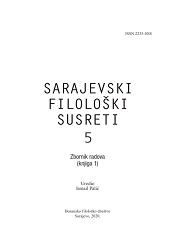Nešto napomena o suznačnim glagolima i predikatu u bosanskome jeziku
A Few Notes on Synsemantic Verbs and Predicate in Bosnian
Author(s): Ismail PalićSubject(s): Syntax, Lexis, Semantics, South Slavic Languages
Published by: Bosansko filološko društvo
Keywords: synsemantic (copulative semicopulative and phrasal) verbs; predicate; lexical meaning; grammaticalization;
Summary/Abstract: This paper deals with the predicates in Bosnian in which grammatical categories are expressed by synsemantic verbs. They are approached from the syntactic and semantic perspective. The following are some of the main findings: there is no justification for the equation between auxiliary (helping) verb biti and copula biti in Bosnian; it is more appropriate to describe the so-called complex verb forms (Bos. složeni glagolski oblici) as syntactic constructions. Bosnian has more than one copulative verb (e.g. predstavljati, podrazumijevati, značiti, stajati...). Semicopulative verbs function as modified copulas (cf. postati x = p očeti b iti x). The predicative complement in a semicopulative construction is characterised by semantic independence, which makes it possible for the question to be focused on it (e.g. Postao je otac. – Šta je postao?). The complements in the predicative constructions can choose between two or even more grammatical forms (including the form of the clause), which makes them different from indirect objects. The most complex constructions are the periphrastic predicative constructions. Their head verbs can be divided in two groups: (1) lexically and semantically “emptied” verbs (verbs with so called “categorial” meaning, copulas and semicopulas) and (2) contextual (contextually motivated) phrasal verbs. In defining and analysis the periphrastic predicative constructions it is most important to bear in mind their two key properties: (1) they have undergone a metaphoric extension process of a connection of verb and noun that commonly stands in relation to a verb or an adjective, which are units of the language lexical system or there is a lexical gap in their place in the system; (2) they belong to the model which is adopted as a way of generating/deriving of the specific syntactic constructions and which has become a routine for the speakers, which means that there is an axis of the predicative complements selection.
Journal: Sarajevski filološki susreti: zbornik radova
- Issue Year: 5/2020
- Issue No: 1
- Page Range: 19-46
- Page Count: 28
- Language: Bosnian

